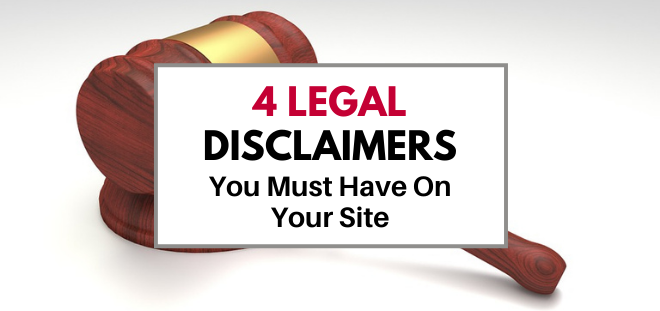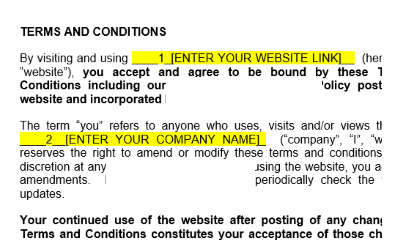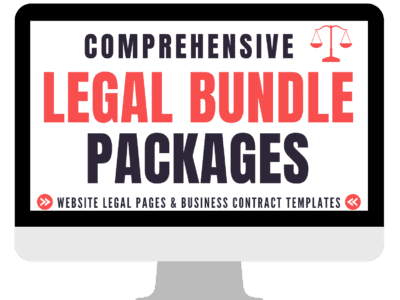Do you have legal disclaimers on your website or blog?
Nobody likes to think about legal issues but it’s important to avoid legal problems that may occur when publishing a website or blog. In this blog post you will find out how you can easily avoid legal problems with your website or blog.
How to Easily Avoid Legal Problems with Your Blog with Legal Disclaimers
You’ll be happy to know that it’s easy to avoid legal problems with your blog or website by simply putting up some disclaimers. Well-drafted agreements focus on key legal issues to avoid. They can prevent costly disputes and lawsuits.
What are Legal Disclaimers
Disclaimers on your website protect you and limit your liability for the content you provide on your site. They inform your readers that the content you are providing is for information purposes only and that you are not responsible for any misuse of the information.
Amira from aselfguru, a business lawyer, states the following:
“A legal disclaimer on your website is a statement that serves to limit your legal liability for the content you publish.
It informs the visitors and users of your website that all information on your website is for informational and educational purposes only and does not constitute advice of any kind (e.g. legal advice, tax advice, financial advice, real estate advice, health advice, etc.).”
Check out the legal templates Amira provides for web publishers and bloggers here.
Why You Need Legal Disclaimers On Your Website
- You need to use disclaimers to avoid lawsuits, legal liability and damages.
- Some disclaimers are required by specific laws. For example, some state and federal laws require websites and blogs to have a privacy policy that informs visitors how they collect and use their personal information.
- You are taking the risk of getting high penalties and getting sued if you don’t have disclaimers on your site.
Examples
By using a website disclaimer, you can wave liability if someone’s computer became infected or damaged, or personal information is hacked because someone visited your website.
A website disclaimer can state that the information or advice you provide should not be taken as legal or medical advice, that you are making no representation regarding the accuracy of the information, and that visitors are accepting all risks.
Here’s my disclaimer about this blog post: “Before reading on, I want you to know that I am not a lawyer and I am not qualified to give any type of legal advice.”
4 Legal Disclaimers You Must Have on Your Site.
The type of disclaimers you need will depend on your website content and activity. But here are typical disclaimers most websites need.
Every blog must have a privacy policy, a disclaimer, and a terms & conditions page. And most blogs need additional disclaimers.
1 – Privacy Policy
Privacy is a big issue today.
Several state and federal laws require that every website or blog has a privacy policy that informs visitors how you collect and use their personal information.
You also need to be compliant with the CAN-Spam Act and the GDPR (General Data Protection Regulation). The Federal Trade Commission (FTC) keeps an eye on websites and ensures that websites follow information privacy laws.
A privacy policy mentions how a website treats the information your users provide. It should include information on how you collect, use and store user information on your site, and FTC and GDPR compliance. Your privacy policy also needs to mention any information you collect automatically, including Google Analytics and cookies.
For example, If you’re collecting email addresses through email marketing services such as Aweber, ConvertKit, Getresponse, MailChimp or other, you must have a Privacy Policy on your site.
Looking for a good email marketing service? You can read my reviews of the most popular autoresponder and email marketing services here.
Amira provides a comprehensive Privacy Policy Template for your sites and blog. Because these templates are created by a lawyer, you know that your site will be in compliance. Get more info about her Privacy Policy Template here.
See how easy and clear her instructions are.
2 – Website Terms Disclaimer and Conditions/Terms of Use or Disclaimer
The “Terms and Conditions”, “terms of use” or “terms of service” disclaimer may include various disclaimers and notices. It may also include copyright and privacy policy. They can be combined in one disclaimer or be separate pages.
Issues you must cover in the terms of service include:
- A limitation of liability statement.
- A statement about affiliate links and links to and from external sites.
- A statement about intellectual property and permitted uses of website materials.
- The local law applicable in determining any disputes.
- Your needs will vary depending on the type of website and the products and services you’re offering. Obviously, the needs of a large corporate site will be different than those of a small blog.
Amira’s legal templates are super easy to personalize. Just see her yellow highlights and fill in the required information.
Get more details about Amira’s Terms and Conditions Template here.
Copyright Notice
You typically find a copyright notice at the bottom of most websites or blogs. The copyright notice tells people that they can not use your content as their own.
More Disclaimers You May Need on Your Site.
Income Statement
The FTC (Federal Trade Commission requires that you disclose your affiliate relationships, third party links on your website and financial rewards. These include commissions and incentives you receive from affiliate marketing. Here are the guidelines provided by the FTC.
You may need additional disclaimers if you mention income, income reports, success results, product reviews, testimonials, and more. You can read a detailed guide provided by the FTC here.
Having disclaimers on your site is important. They will go a long way in protecting yourself and covering you legally. You don’t want to take the risk of not having them.
As you can see, there are many types of disclaimers you may need. And using Amira’s legal forms and templates is the easiest way to protect yourself.
Check out the legal templates Amira provides for web publishers and bloggers here.
Here are some of the forms you may need on your site:
Comprehensive Legal Bundle Packages
Terms and Conditions Template
Privacy Policy Template
Disclaimer Template
Confidentiality Agreement
Affiliate Agreement
Independent Contractor Contract
Freelance Legal Bundle
Sponsored Posts Contract Template
LLC Operating Agreement
Coaching Agreement
Partnership Agreement
Guest Blogger Agreement
Media Release Agreement
Sweepstakes Template
Virtual Design Agreement
Transaction Coordinator Agreement
Transaction Coordinator Legal Bundle
4 ways to get disclaimers for your site.
- You can write your own. But if you don't use the correct wording, you may not be protected.
- You can find free disclaimers. Again, you can't be sure that they will legally protect you.
- You can have an attorney write custom made disclaimers for you. This is a good but expensive option.
- You can purchase disclaimers templates made by a legal professional. This is an inexpensive and easy solution that will protect you legally.
Amira provides ready-to-use forms for most of the common issues your blog is likely to encounter.
Amira's well-drafted, sound fill-in-the-blanks legal forms and agreements templates are simple to customize to fit your needs. Her simple, clear layouts are a lot easier to read and use than most similar legal documents. These forms cover all the important legal bases without using the typical difficult-to-understand legalise.
Making a small investment in legal templates for your blog can go a long way in protecting your business and avoiding costly lawsuits.
Check out Amira's Comprehensive Legal Bundle Packages here.
BLOGGING RESOURCES
- Hosting: Bluehost & SiteGround.
- WordPress themes: ElegantThemes/Divi, GeneratePress, Genesis theme from StudioPress & DIYThemes.
- Popular email marketing providers: Aweber, GetResponse, Kit, and MailChimp.
- The best online spelling and grammar checker: Grammarly.
RECOMMENDED READING
- 12 Ways to Make Money Blogging
- How to Set up a Money-Making Blog
- What is The Right Blogging Platform To Make Money Blogging?
- How to Choose an Effective Domain Name to Attract Buyers to Your Blog
- What Are the Best WordPress Themes?
Post Footer automatically generated by Add Post Footer Plugin for wordpress.








